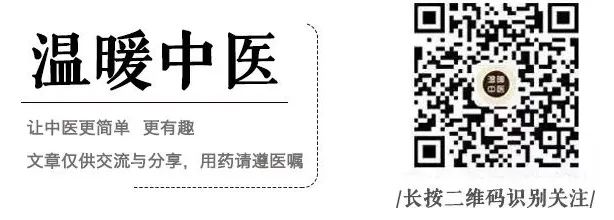
Click the blue text above to follow us

Written by: Warm TCM
In life, having great aspirations leads to great achievements.
■
Phlegm-dampness causes numerous diseases; this statement is not without reason.
To eliminate phlegm-dampness, traditional Chinese medicine (TCM) has indeed established many effective decoctions throughout history. Today, I would like to introduce a particularly potent formula: Suzi Jiangqi Decoction (Perilla Seed Decoction).
There is an elderly gentleman, nearly seventy years old, who often feels an excessive amount of phlegm, as if his chest is blocked. Why do I say this? Because in addition to the phlegm, he frequently experiences chest tightness, as if the sky is overcast with dark clouds before a storm, giving a feeling of extreme heaviness.
What other symptoms does he have? Coughing, especially when resting; he needs to elevate his pillow, as lying flat triggers coughing. He experiences shortness of breath while walking, fatigue, and weakness in his lower back and legs.
Looking at his tongue, it is pale with a white coating, and the surface is moist.
This gentleman’s condition is not difficult to manage; Suzi Jiangqi Decoction can help, and there is also a Chinese patent medicine called Suzi Jiangqi Wan (Perilla Seed Pills).
Suzi Jiangqi Decoction: 10g Suzi (Perilla Seed), 5g Chenpi (Dried Tangerine Peel), 3g Rougui (Cinnamon), 6g Qianhu (Hogfennel), 6g Danggui (Angelica Sinensis), 10g Banxia (Pinellia), 6g Houpule (Magnolia Bark), 5g Zhi Gan Cao (Honey-fried Licorice), 3 slices of Shengjiang (Fresh Ginger).
The name Suzi Jiangqi Decoction starts with Suzi.
Suzi is the seed of Perilla, and the leaves we often see on our dining table are the leaves of Perilla. This herb, from its leaves to stems and seeds, is a valuable medicine in TCM.
Suzi Jiangqi resolves phlegm and regulates Qi. Why is it necessary to regulate Qi? Let’s return to the medical case: on the surface, coughing and shortness of breath are lung issues, but the deeper cause lies in the kidneys. The kidneys have the function of receiving Qi, and lung Qi needs the kidneys to support it. Normally, each breath is effortless, but when the kidneys are deficient, they cannot receive Qi, causing the inhaled Qi to not descend properly, leading to shortness of breath and coughing.
The pale tongue with a white coating indicates Yang deficiency; kidney Yang deficiency prevents fluids from transforming into Qi, leading to the accumulation of phlegm-dampness. The more phlegm-dampness accumulates, the more it rises to the chest, enveloping the lungs and causing chest tightness.
At this point, we need to utilize the action of Suzi Jiangqi to descend this unanchored Qi. Chenpi has a slightly bitter taste, which can help descend and promote the movement of Qi downward, assisting Suzi in its action. Essentially, it helps to ensure the smooth flow of Qi in the body; when the Qi flows smoothly, the phlegm in the chest will also dissipate, as phlegm follows the movement of Qi.
Qianhu stops coughing while simultaneously resolving phlegm.
Banxia dries dampness and transforms phlegm, and it can also descend Qi. Together with Suzi and Chenpi, phlegm becomes easier to descend.
Where does it descend to?
It descends to the intestines, which are a crucial pathway for expelling pathogens from the body. Therefore, it is essential to ensure the intestines are unobstructed for phlegm-dampness to be completely expelled. Houpule is particularly adept at unblocking the Qi of the stomach and intestines, while Danggui moistens the intestines and promotes bowel movements.
Due to Yang deficiency, we also add Rougui to warm the kidneys and assist Yang, along with Shengjiang to disperse cold and Zhi Gan Cao to tonify the spleen and warm the middle, aiming to warm the body, which also aids in transforming phlegm-dampness.
Suzi Jiangqi Decoction dates back to the Song Dynasty and comes from a reputable lineage. As many know, there is a medical text from the Song Dynasty called “Taiping Huimin Heji Ju Fang,” which includes Suzi Jiangqi Decoction.
Although it has nearly a thousand years of history, its efficacy remains unchanged; it can regulate conditions such as emphysema, chronic bronchitis, plum pit Qi, and asthma.
When applying this formula, remember four key concepts: excess above and deficiency below. There are both excess and deficiency syndromes; excess refers to the presence of pathogenic factors, and phlegm-dampness is a type of excess pathogen, accumulating in the chest and causing fullness and tightness. Weakness in the lower limbs indicates deficiency syndrome, which is due to kidney Yang deficiency, leading to a series of symptoms. On one hand, the kidneys cannot receive Qi, resulting in coughing and shortness of breath; on the other hand, fluids cannot transform into Qi, leading to excessive phlegm.
Disclaimer
This article was first published on the WeChat public account Warm TCM. All rights reserved by Warm TCM. Any infringement will be pursued!


